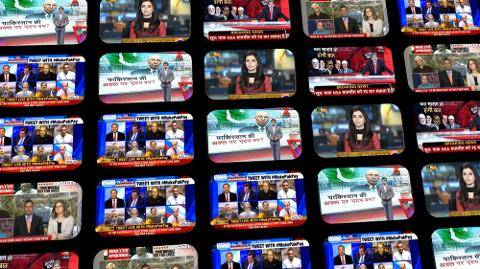Media, whether it is print, electronic or social, plays a vital role in not only the transmission of information but also in the formation of public opinion. Since the emergence and evolution of media from print to social media, it has played a significant role in numerous movements for gaining rights and various revolutions to overthrow the authoritarian rulers and to regain lost glories of nations. Media was important when women began the struggle to gain the right to vote, the right to property and right to purse in the West in the late 19th and early 20th century. Even during the Civil Rights Movement in America in the mid of 20th Century when the African Americans were struggling to gain equal rights and to end racial discrimination in USA, media played a significant role. Since media plays such an important role in mobilizing the public, it has simultaneously been used by the authoritarian dictators such as Adolf Hitler and Joseph Stalin to glorify the dictatorial rule and to curb any rebellious opinion and stance from being voiced against the dictatorial government.
Similarly, the important role of media cannot be denied in the democratic sector. Free media has been recognised as the cornerstone of democracy as it helps in influencing the political discourse during the general elections. Media is actually an important tool of democracy. From informing people about their rights and duties, providing people a platform to voice their opinions and expressing their grievances, providing information to people regarding the agendas and manifestoes of various political parties and encouraging people to vote, media plays a vital role in the entire democratic process.
In Pakistan, both media and democracy have an interlinked history. While democracy has had a troubled history in our country with repeated termination and abolition of elected governments and recurrent Martial Laws, the media has also not been free since the independence. Initially, Pakistan had only three state-owned news channels and a negligible number of national newspapers, the media gained relatively liberated in the brief tenure of elected governments and it got highly restricted and entirely state controlled during the era of military dictators. In the first decade of 2000, the broadcast media gained liberty under the rule of General Perverz Musharraf. “In one decade the country observed media grew so powerful that it emerged as a fourth pillar of the state and played a great role in the downfall of dictatorial regime,” (International Media Support, 2009). Then in 2008, the general elections were held with a relatively liberal media and a relatively informed public. As the government of 2008 was the first elected government in the history of Pakistan that was able to complete its tenure, so the media since then has gained liberty that it never previously had.
The elections of 2013 witnessed a very vigilant role of media. From print to electronic to social media, media played an active role in mobilizing the public opinion. Political parties advertised their manifestoes and agendas in the print, as well as electronic media, appealing to various sectors and classes of the society. The three major political parties, Pakistan Muslim League-Nawaz (PML-N), Pakistan Tehreek-e-Insaaf (PTI) and Pakistan People’s Party (PPP), through their advertisements, reached out to different age groups and sectors throughout the country. According to a research, PTI dedicated a major portion (41 percent) of its political advertisement to appeal the youth, PPP spent one third part of its political advertisement for youth and with PML-N spending a 13 percent of its advertisement for the youth. Through media, political parties have made use of celebrity endorsement in order to increase the voter turn-out in their favor. Apart from the advertisements, various talk-shows including leaders and spokespersons form political parties were held on many news channels by means of which, the public got awareness regarding the point-of-view of different leaders. “Fighting and arguing on media platforms can be evaluated by the public to assess the temperament of the leaders and their ethical values,” (Vresee, 2008). This helped the public to form their own learned opinion and also helped them decide who to vote for. Apart from the talk-shows that include representatives from political parties, the talk-shows that include debates between journalists and senior-political analysts also assisted people in deciding and differentiating between the wrong and the right.
Another significant and commendable role played by media in the elections of 2013 was to make people aware of the sheer importance of the vote. Through advertisements, talk-shows, articles and columns, the media encouraged people to vote by making them believe that to cast a vote is national duty. Overall, in the elections of 2013, the role of media was so significant that the Chief Election Commissioner of Pakistan attributed the higher voter turnout to the efforts of media.
However, since there are above one hundred news channels and media groups, many of which are privately owned, a problematic side of the role of media is its biasness. At times, certain media groups are seen voicing their own opinions in favour of a certain political party while opposing the others; damaging the journalistic ethics.
As the role of media in the entire process of elections cannot be neglected in the 21st century, the liberalization of media in Pakistan and its important role in the general elections is undoubtedly a positive sign and a ray of hope for the democracy in Pakistan. The loopholes that are present in media can be overawed by training the media personals to counter the hate-speech and by improving the quality of media output. This can only be done by involving long-term capacity building through institutional support for university departments and by inculcating journalistic ethics through various short-term journalistic training programmes.






